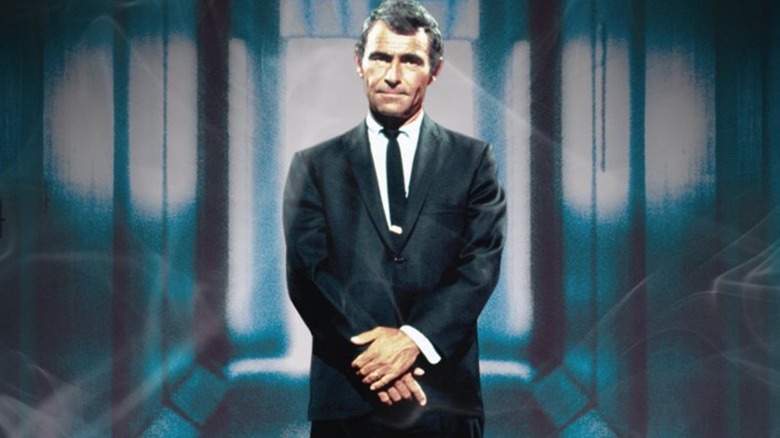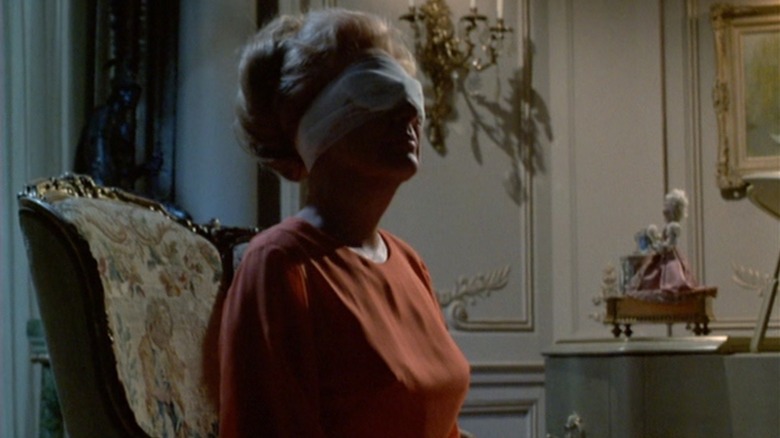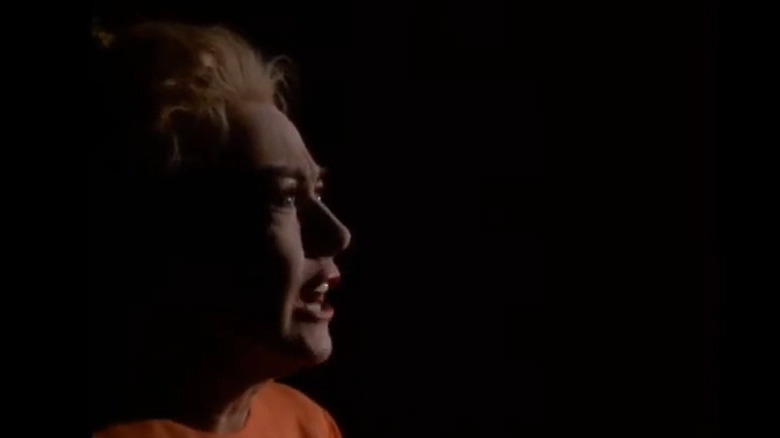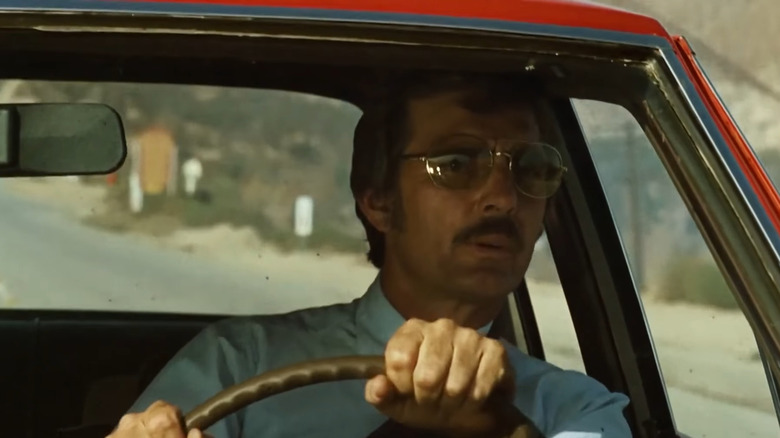Directing Joan Crawford In Night Gallery Was A 'Baptism By Fire' For Steven Spielberg
Where "The Twilight Zone" was Rod Serling's outlet for scathing social commentary through the lens of science fiction, "Night Gallery" opted to focus more on stories involving supernatural occurrences. Serling's sister show wasn't nearly as captivating, but it was still a pretty fun anthology program in its own right. The pilot film featured three stories, each of which was handed to a different director.
Boris Segal ("The Omega Man") directed "The Cemetery," which saw "Planet of the Apes" star Roddy McDowall as a contemptible heir who becomes haunted by a series of paintings that appear to show the corpse of his recently deceased uncle. "The Escape Route" was helmed by Barry Shear ("The Deadly Trackers"), and starred Richard Kiley as a Nazi war criminal who's adoration with a painting lays the track for an appropriate punishment. Smack dab in the middle was a segment directed by none other than a 22 year-old Steven Spielberg, which was also the young filmmaker's first professional industry gig.
In this story entitled "Eyes," Academy Award-winning actress Joan Crawford ("Mildred Pierce") plays Claudia, a blind woman who would do just about anything to be able to see again. She uses her exuberant wealth to pay a desperate man $9,000 for the use of his eyes, even though the effect will only last for about 12 hours. The illegal operation goes according to plan, but when she opens her new gaze upon the world, a terrible twist of fate puts her in a terrible predicament.
When it came to bringing this story to life, young Spielberg could definitely feel the collective pressure to get it right.
The new kid in town
In a 2006 interview with the Director's Guild of America, Spielberg talked about how television was his gateway to being a better filmmaker. "The fact that I was doing TV was going to be a postgraduate program on the way to making feature films; that's how I regarded television. It was a learning process," says Spielberg.
When he was making his home movies, Spielberg only had to deal with a small number of people to wrangle. With a Universal production, however, he was a minnow in a sea of catfish. Suddenly he was working with over 75 crew members, with his lead star being a Hollywood legend. The moment all eyes were on him, Spielberg felt like he had to prove why he was put in charge:
"When I showed up with my acne and my long hair and the viewfinder pretentiously around my neck, like some kind of a talisman that would protect me from all evil, I think they took one look at me and they said, this kid better prove himself quickly or he's out of here. The rank and file of the crew was just sending daggers my way, working as slowly as they could—not to get themselves fired, but maybe to get me pushed off the show. It was a real baptism by fire."
Taking a step forward in any industry can be a daunting task, let alone the film industry. For a first-timer, "Eyes" is still a pretty great story that makes creative use out of its setting, as it largely stays within Crawford's NY high-rise apartment.
'I needed to get final cut someday'
The ultimate irony of "Eyes" arrives in the form of a blackout, just as Crawford rips off her bandages. She's gifted with the brief flicker of a chandelier before the city goes into a surprise blackout until the next morning. One of Spielberg's big flourishes shows Crawford in her bright red dress, as she panics in a hollow black void of her own making. Although you can see Spielberg's ingenuity in moments like this throughout his "Night Gallery" segment, the experience taught him a lesson that he would carry into his filmmaking career (via D.G.A.):
"I learned immediately that I needed to get final cut someday because a director in television loses control the second that he walks off the sound stage and post production begins and editorial takes over. Then the producers get very involved and kind of over-cut you or re-cut you or second-guess the cutting of the film."
On top of all that, there was a great deal of tension between the veteran crew members and Spielberg on set. The silver lining of all of this learning experience, however, was that Crawford stuck up for him at every chance she got. According to a 1982 interview with Gene Shalit, Spielberg talks about how Crawford went so far as to lie about working with him before, in order to ensure the crew treated him with respect.
Even though he sees "Eyes" as a lesser stage of his career, Spielberg ultimately made a good impression, as he was hired to direct another "Night Gallery" episode less than two years later with "Make Me Laugh" as part of his Universal deal.
Spielberg's television journey is pretty solid
Long before Spielberg became the man behind some of our most magical memories on the big screen, it was his television contract with Universal that gave him an avenue to experiment with the form. Sid Sheinberg, the former head of Universal, was the one who signed him after seeing his 1968 short "Amblin," which of course would become the name of Spielberg's production company. In just under 26 minutes, Spielberg beautifully constructed a wordless tale of two young travelers discovering themselves on the road. It was only rational to see what else he could do next.
The Universal contract led him to work on such television shows as "Marcus Welby, M.D.," "The Name of the Game," and one of the very first episodes of "Columbo." Spielberg wanted to make movies, but without his work here, he likely wouldn't have been given the opportunity to make "Duel," one of the greatest television films ever made.
Where he once had less than a half hour to tell a story of the road with only a few actors, Spielberg naturally took this a step further with a feature that was so good, it was ultimately rolled out theatrically in international markets. His imagination was begging to break free from people's television sets.
It's crazy to think that he started his directing career with Crawford in one of her final roles, and has now reached the point where Michelle Williams and Paul Dano, two of our greatest working actors, are now playing offshoots of his folks in "The Fabelmans," a semi-autobiographical feature about his childhood.
"The Fabelmans" is now playing in theaters nationwide.



